Benefits of an Effective Control Plan
Through this article Benefits of Effective Control Plan shall be discussed in great detail by the author. Control Plans are necessary for project success.

Through this article Benefits of Effective Control Plan shall be discussed in great detail by the author. Control Plans are necessary for project success
Benefits of an Effective Control Plan as an important constituent of Lean Six Sigma Projects shall be discussed through this article.
Control Plans are made with the purpose of providing predictive information. They are primarily made with for prevention purpose to ensure action can be taken before defects happen in the process. Basically, they are made to ensure that process meets the customer requirements at all times.
Benefits of an Effective Control Plan: Control Plan is a document consisting of procedures and activities vital to the performance of a process or product. It ensures that all activities related to the process remain within control at all times. An effective Control Plan also provides for reactionary mechanism in case process gets out of control or there is any special cause happening in the process. The mechanism may be in the form of any contingency plan or some other structure which takes action when the process seems to be out of control.
Six Sigma lays a lot of importance on Control phase to ensure that gains witnessed in the Improve phases of the Six Sigma project become part of the process. It is highly likely that if efforts are not made towards this, then very soon all the gains will be frittered away and the situation will be back to square one. Control Plans play a vital role in this strategy to ensure that the hard earned gains are sustained in the process.
When a new process is designed or an existing process is modified, Control Plans become a part of the process, exhibiting inherent self-control. All the earlier approaches of frequent tampering with the process for providing temporary fixes to the problem s will not be required. The process becomes robust and dynamic. Any problem occurring in the process will be caught in the bud and solved before it gets out of hand; this is because of the controls prescribed in the control plan and the process map where checks are incorporated in the process to ensure that the process keeps on performing as desired. Even if controls for all activities in the process are not provided, still a good control plan should prescribe controls for those activities which are vital to the functioning of a process.
To ensure that process remains under control, an audit mechanism is also prescribed. Regular audits at fixed periods are planed and performed for both operators and equipment. Audits for equipment can be in form of ensuring their calibration at fixed periods and matching the performance with legal or customer prescribed standards, whichever are applicable. A plan for preventive maintenance can also be incorporated to ensure that machinery is serviced at regular intervals. Similarly, audit plans for operators can be prepared and conducted where their performance and other information is matched with the product or process requirements.
A good control plan can significantly impact the performance of a process. It can bring about many positive changes in people, equipment and material involved in the process and also ensure that problems occurring previously in the process do not take place again. In fact, the same can be replicated in other areas in the organization also.

 Pankaj Kumar
Pankaj Kumar 

































Comments (0)
Facebook Comments